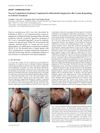 11 citations,
January 2011 in “Developmental neurobiology”
11 citations,
January 2011 in “Developmental neurobiology” Ptprq has multiple forms that change during inner ear development.
 14 citations,
January 2015 in “Acta dermato-venereologica”
14 citations,
January 2015 in “Acta dermato-venereologica” Acitretin significantly reduced inflammatory attacks in a woman with Naevus Comedonicus Syndrome but caused side effects.
 November 2022 in “The journal of investigative dermatology/Journal of investigative dermatology”
November 2022 in “The journal of investigative dermatology/Journal of investigative dermatology” The STRIPAK complex is crucial for skin cell organization and creating a functional skin barrier.
110 citations,
November 1984 in “The American Journal of Medicine” A genetic defect in vitamin D receptors causes severe rickets and hair loss in children, but some heal as they age.
Hairless mammals evolved quickly in both gene and non-gene areas related to skin and hair.
 September 2023 in “Medicine”
September 2023 in “Medicine” The research suggests immune system changes and specific gene expression may contribute to male hair loss, proposing potential new treatments.
 1 citations,
January 2016 in “Journal of Nepal Paediatric Society”
1 citations,
January 2016 in “Journal of Nepal Paediatric Society” A child with rickets and hair loss might have a rare type of rickets that doesn't improve much with usual vitamin D and calcium treatment.
 October 2023 in “Journal of the Endocrine Society”
October 2023 in “Journal of the Endocrine Society” Joint replacement surgery normalized high alkaline phosphatase levels in a patient with severe osteoarthritis.
11 citations,
April 2012 in “Journal of Investigative Dermatology” A specific mutation in PA-PLA1α causes abnormal hair growth.
 44 citations,
February 2012 in “The journal of neuroscience/The Journal of neuroscience”
44 citations,
February 2012 in “The journal of neuroscience/The Journal of neuroscience” Mutations in the PTPRQ gene cause significant balance issues in mice due to hair bundle defects in the inner ear.
52 citations,
August 1993 in “Clinical endocrinology” Intravenous and oral calcium effectively treated vitamin D dependent rickets type II, improving growth and bone health.
 June 2022 in “Authorea (Authorea)”
June 2022 in “Authorea (Authorea)” Efficient delivery systems are needed for the clinical use of CRISPR-Cas9 gene editing.
 3 citations,
September 2019 in “Clinical and experimental dermatology”
3 citations,
September 2019 in “Clinical and experimental dermatology” Basal cell carcinomas may differentiate similarly to hair follicles and could be influenced by hair cycle-related treatments.

Tacrolimus causes fewer acute rejections than cyclosporin A in kidney transplants but doesn't necessarily improve kidney function after one year; cardiovascular risks and side effects vary between the two drugs.
 May 2004 in “International Journal of Cosmetic Science”
May 2004 in “International Journal of Cosmetic Science” Melanogenesis inhibitors like kojic acid and niacinamide can reduce inflammation and pigment production in skin cells.
45 citations,
December 2006 in “Baillière's best practice and research in clinical endocrinology and metabolism/Baillière's best practice & research. Clinical endocrinology & metabolism” Vitamin D and its receptor are essential for hair growth, cell regulation, immune function, and heart health.
 18 citations,
January 2008 in “Journal of The American Academy of Dermatology”
18 citations,
January 2008 in “Journal of The American Academy of Dermatology” Certain proteins and their receptors are more active during the growth phase of human hair and could be targeted to treat hair disorders.
 25 citations,
April 2015 in “Current problems in dermatology”
25 citations,
April 2015 in “Current problems in dermatology” Hair regrowth slows with age and can be affected by treatments that change enzyme activity in the skin.
505 citations,
December 2011 in “Journal of clinical oncology” MK-2206 was safe and effectively blocked AKT signaling in cancer patients, warranting more trials.
November 2022 in “Journal of Investigative Dermatology” Occipital hair follicles in male pattern baldness respond uniquely to testosterone, not androgen-insensitive.
 September 2024 in “Journal of the American Academy of Dermatology”
September 2024 in “Journal of the American Academy of Dermatology” Estetrol (E4) may help treat female pattern hair loss by prolonging hair growth.
7 citations,
August 2019 in “JAAD Case Reports” Hidradenitis suppurativa may be more severe in people with Mediterranean fever gene mutations.
 23 citations,
June 2016 in “FEBS Journal”
23 citations,
June 2016 in “FEBS Journal” Boosting β-catenin signaling in certain skin cells can enhance hair growth.
 11 citations,
January 2020 in “BMC pediatrics”
11 citations,
January 2020 in “BMC pediatrics” New mutations in the SLC39A4 gene found in twins help understand the genetic cause of acrodermatitis enteropathica.
February 2017 in “The Journal of urology/The journal of urology” Castration significantly reduces prostate size and BPH symptoms.
30 citations,
October 2013 in “BMC dermatology” VEGF gel increases hair growth but may have potential toxicity.
9 citations,
July 2022 in “Journal of Biological Chemistry” WWP2 is crucial for tooth development in mice.
 November 2022 in “Journal of Investigative Dermatology”
November 2022 in “Journal of Investigative Dermatology” The medicine Cyclosporin A might cause excessive hair growth by reducing a protein that controls hair growth.
 December 2023 in “Journal of nutritional science and vitaminology”
December 2023 in “Journal of nutritional science and vitaminology” A zinc-deficient diet stunted growth and affected organs in mice, with C57BL/6J mice showing more severe symptoms.


















